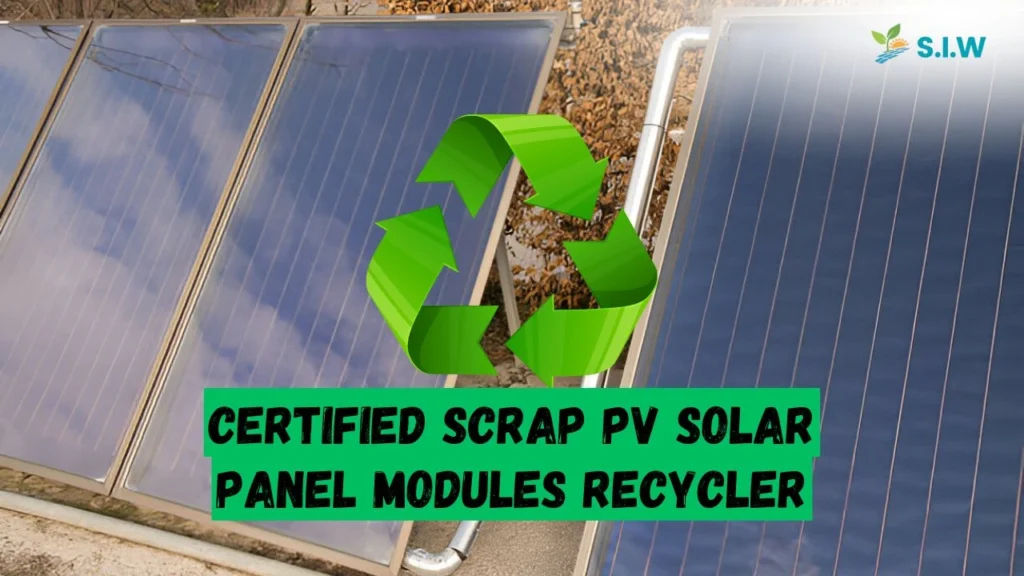As renewable energy solutions become mainstream, photovoltaic (PV) solar panels have become vital in reducing global reliance on fossil fuels. However, like all technology, solar panels have a limited lifespan. As PV modules age or become damaged, the need for efficient recycling solutions becomes critical. A certified scrap PV solar panel modules recycler offers a sustainable approach to managing end-of-life solar panels, ensuring that valuable resources are repurposed and environmental impact is minimized.
The Importance of PV Solar Panel Recycling
Environmental and Economic Benefits
Recycling solar panels isn’t just about waste management; it’s a process that contributes directly to sustainable development. By recycling PV solar panels, we reduce the need for new materials, thus decreasing the environmental footprint associated with mining and processing raw resources. Recycling also mitigates harmful waste from ending up in landfills and leaching into soil and water systems. Additionally, reclaiming valuable materials like silicon, silver, and copper can significantly reduce costs in the production of new solar technology.
PV Module Lifespan and Recycling Necessity
Typically, solar panels have a lifespan of 25-30 years. As the first generation of large-scale solar farms begins to age, the volume of panels needing recycling is set to rise dramatically. Without proper recycling infrastructure, the risk of these panels contributing to environmental pollution increases. Certified recyclers play an essential role by adhering to environmental regulations and guidelines, guaranteeing that these panels are processed responsibly.
Certified PV Solar Panel Recycler: What Sets Them Apart?
A certified recycler possesses the necessary certifications and complies with all relevant environmental laws and safety standards. Working with certified recyclers ensures that:
- Compliance with Local and International Standards: Certified recyclers comply with environmental regulations, ensuring that hazardous materials are managed responsibly.
- Efficient Recovery Processes: Certified recyclers utilize advanced technology to maximize the recovery of valuable materials from each panel, contributing to a more circular economy.
- Ethical and Transparent Operations: Certified recyclers often maintain transparency in their processes, demonstrating commitment to environmental and social responsibility.
The PV Solar Panel Recycling Process
1. Collection and Transportation
Panels are collected from various sources, including residential, commercial, and industrial installations, and then transported to a recycling facility. Certified recyclers follow guidelines to ensure safe handling, minimizing the risk of accidental release of harmful substances.
2. Pre-Processing and Dismantling
In the pre-processing phase, panels are dismantled into their components. Frames, junction boxes, and cables are removed, making it easier to separate glass, metals, and other materials. This stage is crucial, as proper dismantling can prevent contamination and ensure materials are fully recyclable.
3. Crushing and Material Separation
Once dismantled, panels undergo a crushing process to break them into smaller pieces. Separation technologies, including electrostatic separation, magnetic separation, and sieving, are used to separate metals, glass, and silicon.
4. Chemical Processing for Material Recovery
In this stage, various chemicals are employed to further refine and recover metals like silver, copper, and tin. Silicon, an essential component of solar cells, can also be reclaimed and purified for use in new panel manufacturing, ensuring nothing goes to waste.
5. Final Disposal or Repurposing of Non-Recyclable Components
Some components, especially certain types of plastic or heavily degraded silicon, cannot be recycled. Certified recyclers follow environmentally safe disposal practices or explore avenues for repurposing these materials in other industries.
Key Materials Recovered During PV Solar Panel Recycling
Silicon
Silicon wafers are reclaimed and can either be repurposed in new solar panels or used in the semiconductor industry. Recovered silicon must meet quality standards to be reused effectively.
Glass
Solar panels contain a significant amount of high-quality glass. Recycled glass is often reprocessed to manufacture new panels or other glass products, reducing the need for new raw materials and lowering production costs.
Metals
Metals like silver, copper, and aluminum are highly valued due to their conductivity and durability. Reclaiming these metals from panels allows recyclers to supply manufacturers with cost-effective, recycled materials.
Benefits of Choosing a Certified PV Solar Panel Recycler
- Environmental Responsibility: Certified recyclers adhere to high environmental standards, helping reduce pollution.
- Resource Conservation: By recycling valuable materials, the demand for virgin materials is reduced.
- Cost-Efficiency: Recycling allows for cost-saving in manufacturing, promoting a more affordable solar industry.
- Long-Term Sustainability: The transition to a circular economy becomes achievable as more panels are responsibly recycled.
FAQs
1. Why is PV solar panel recycling essential?
Recycling solar panels helps conserve natural resources, reduce environmental waste, and support the sustainable growth of renewable energy by supplying valuable materials for future panels.
2. How do certified recyclers handle hazardous materials?
Certified recyclers follow strict environmental guidelines to safely manage and dispose of hazardous materials, minimizing any risks to human health and the environment.
3. What materials can be recovered from recycled solar panels?
Commonly recovered materials include silicon, glass, and metals such as silver, copper, and aluminum, all of which are essential for creating new solar panels or other products.
4. How can I locate a certified PV solar panel recycler?
Many certified recyclers are listed in environmental directories or can be located through solar panel manufacturers who often collaborate with recyclers to ensure proper panel disposal.
5. What happens to non-recyclable components?
Non-recyclable components are safely disposed of or repurposed in other industries, ensuring they don’t contribute to environmental waste.








